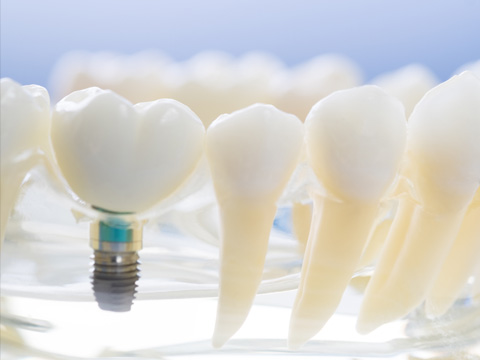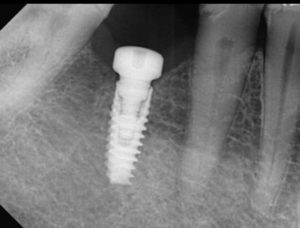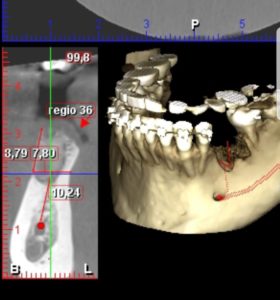
Definitely, a specialty of our institution is a planned replacement of teeth with dental implants. . Implants are a form of permanent replacement of damaged or missing teeth. If you’re looking for affordable or the highest quality, our dental team in City Dent Banja Luka offers the highest level of service.
The entire process begins with a survey and treatment that prepare the patient for the process of implementation of an implant.
Implementation of an implant is the last step before checking if the jawbone is healthy enough to support them. Dental implantological treatment has a high success rate that is commonly higher than 98% but the key to successful treatment lies in the choice of the best specialist for the job.
Despite many dentists that offer this kind of treatment, we are one of the rare ones that stand out with our years-long experience and the use of technologies and materials of utmost quality.
Contact us today and we will gladly advise You about the best solution that works for You and is specifically tailored to your needs
Call us: +387 (0)66 313 555
E-mail: [email protected]
Address: Milana Tepića 27, Banja Luka

Offered types of procedures:
Dentures
Dentures can be removed by the patients solely for the purpose of maintaining oral hygiene if the need arises. Their highest advantage is very simple maintenance and a very swift repair works in cases where the prosthetic gets damaged.
This type of prosthetic can encompass two or more implants.
Total or partial prosthetics are the most common types of works. They are typically reined in with the help of implants and bonding element (equator, locator or the ball). The chewing pressure is transferred on the oral crevice and gums while implants in this case only serve stabilize (rein) the prosthetic or in other words prevent its removal from the oral crevice.
The second type of works that patients are able to remove by themselves is the one mounted on the Friesian bridge. The biggest advantage of this type of prosthetic is that it’s extremely easy to maintain perfect dental hygiene and perform simple repairs due to occasional denture chipping. With this method, the chewing pressure is completely transferred onto the implants and the bone providing a natural and comfortable sense of chewing. In this way, you achieve the best possible aesthetic, especially in cases of uneven loss of jaw bone. This type of work is the most common type among patients of the European countries. Eventual complications are solved very quickly and these types of works can and usually will be able to handle the loss of one or two implants. These types of work tend to require a higher number of implants.
Fixed dentures
The advantages of these types of works are the ability to “remove” the prosthetic part of the teeth but only by a dental specialist. These types of works are commonly known as “screw retained”.
The patient is not able to remove the denture but that can make the maintenance of oral hygiene a bit more difficult. The specialist periodically removes this type of work and solves the problems that occurred on either the implants or the prosthetic part (Denture).
Fixed (cemented) implants
This type of work is the most simple and affordable and that is why it’s the most common type.
To the patients, it offers the highest comfort but most commonly it can lead to unanticipated complications that can cause the removal of the entire work and manufacturing of a new one.
In practice, this type of work is very similar to the cemented bridges on natural drilled teeth.
F.A.Q.
Is the replacement of teeth with dental implants a painful process?
Contrary to the most dental surgical procedures, replacement of teeth with dental implants is a painless process. It’s extremely rare for a patient to show signs (after the implementation and expiration of the anesthetic) of pain and discomfort of any kind.
It is of utmost importance to lower the temperature of the desired operating location (through the skin) with a cold compresses. This in return reduces post-procedure swelling, reduces the chances of bleeding and possibility of painful episodes later down the line. In most cases after the anesthesia wears off one tablet of analgesic is enough to counteract these side effects and it’s not that uncommon that no post-procedure pain-killer medication is required.
The area where the procedure was performed and the sutures must be regularly cleaned with a soft toothbrush for the purposes of a faster healing process as well as removing any unwanted food around the operating area, this is something we would like to emphasize to be of great importance and makes a huge difference.
What are the desired conditions for the replacement of teeth with dental implants?
Dental implants tend to be implemented in most to all cases where no medical counter-indications exist but there exists a need for a replacement of one or more teeth. This issue is most commonly solved with the aid of implants that stave the cases of complete toothlessness (Edentulism).
What are some of the advantages and disadvantages of implantological therapy?
The teeth replacement advantages with dental implants is that it’s not entirely necessary to “touch” the surrounding teeth. In the case of partial toothlessness or avoiding the preprocedural preparation on soft tissue in the cases of complete toothlessness.
Implants offer comfort and the patients gladly accept them and easily adjust to them.
Even in cases of complications it’s rarely the case with painful episodes and inflammations except if it’s a terminal stage of loss of the implant.
Some of the disadvantages of the implantological therapy is the inability of application in cases that are severely ill as well as considerable loss of the jaw bone where as the implementation requires rejuvenation of the lost jaw bone.
What is the expiration date of the replacement dental implants?
It is of utmost importance to emphasize that not one implantological therapy GUARANTEES A LIFE-LONG LONGEVITY. Common sense dictates that if an organism wasn’t able to maintain its own natural teeth the chances are minimal to non-existent that he/she will be able to maintain the foreign body (in our case the dental implants).
The guarantee can be only related to the dental implant itself as it’s made out of a titanium alloy and as such it is almost indestructible but to guarantee a life-long longevity is regarded as foolish. The success of the implantological therapy is measured on a five-year basis as long as the dental implant remains in the jaw bone. The success of this therapy in first five years is above 95% depending on many factors that relate to the number of dental implants that are implanted, their type, oral hygiene, the health of the remaining bone structure and many more.
Because of everything stated above, there is some logic in guaranteeing the entire implantological process up to five years. Every guarantee that wishes to extend that period walks a thin line with being pure speculation and guesswork despite the static data on the global level. However, it is not that uncommon for the dental implants to last over 10-15 years with impeccable oral hygiene and regular checkups.
How to maintain oral hygiene after the implantation of dental implants?
Without impeccable maintenance and oral hygiene the implantological therapy makes no sense. Bad hygiene is number 1 factor that leads to implant loss. Because of that, it is of very important to begin a process of maintaining your oral hygiene on day one after receiving a dental implant.
In maintaining oral hygiene both mechanical and chemical solutions are used. From your everyday toothbrush, dental floss, interdental brushes, oral irrigator, chemical solutions on the basis of chlorhexidine and so on…
More detailed instructions are given by our dentists before and after the implantological therapy.
What is required to begin the implantological therapy?
Before the start of every implantological therapy, it is absolutely necessary to conduct an examination of the current state of the remaining jawbone structure, remaining teeth as well as the general state of the patient.
The following step is a diagnostical method of 3D imagery of the jawbone(CBCT imagery) that allows us to gather more precise information of the remaining bone structure and determine its measure and quality.
It’s one of the most modern ways of analyzing the remaining jaw bone as well as anatomical structures.

Are additional surgical procedures necessary during the implantological therapy?
It is not that uncommon to have a situation where before any replacement can be performed to have a procedure that prepares the area for the implantological therapy as it greatly increases the chances of a successful dental implant.
It’s highly common to have a need to recover some of the lost jaw bone with “artificial bone”.
We as an institution are highly capable of this and we track the most modern ways of restorative and bone regeneration process “GBR” as well as using the growth factors from your own blood derivate “PRF” (the patient blood is taken before the procedure)
In some situations, it’s necessary to perform a “sinus lift” to ensure available vertical space for the implant.
Fill out our questionnaire
UEnter your information below and our staff will contact You.
Other services:

Orthodontics
Orthodontics specializes in irregularities of teeth, their malposition and correction as well as jaw and facial irregularities.

Prosthetics and aesthetics
Prosthetics is meant for anyone that has a missing tooth.

Oral surgery
Different kinds of surgical procedures within the dentistry field

Family dentistry
Adequate dental procedures for patients of all ages

Periodontology
Periodontology is dedicated to treating the supportive structure of teeth.